Do you want to buy and sell stuff online without undergoing a complex process? OfferUp is an online marketplace that lets you do that. However, OfferUp has a few drawbacks, and you may look for an OfferUp alternative.
Here are the best OfferUp alternatives in the market right now.
What Is OfferUp?
OfferUp is an online customer-to-customer (C2C) marketplace where customers can buy and sell stuff online. The trade happens between end customers, and there are no brands or retailers involved. The platform is similar to Craigslist, and it was launched as a competitor to Craigslist and other C2C marketplaces.
OfferUp has plenty of categories, including:
- Fashion
- Used materials
- Antiques
- Baby and kids
- Furniture
- Marines and boats
- Books and magazines
- Bicycles
- Auto parts
- Appliances
- Beauty and health
Why Do You Need an OfferUp Alternative?
Though OfferUp is a fantastic platform, it has a few drawbacks. It’s a mobile-first platform, and thus, its mobile app is quite intuitive. However, the desktop version of OfferUp isn’t essentially the best. It is slow, and the user interface and experience need improvement. Hence, you may want to use an OfferUp alternative. Visit Here
There are dozens of OfferUp alternatives out there, so you should choose the one as per your requirements. Check the user ratings and reviews of all the platforms and find the one that seems to be the most trusted.
Best OfferUp Alternative to Use
Having discussed why you might need an OfferUp alternative, let’s look at some platforms like OfferUp. We have handpicked some websites that offer similar or even better functionalities than OfferUp. Let’s delve into the list.
eBay
eBay needs no introduction. The website has been out there for almost three decades, and it’s one of the biggest eCommerce marketplaces in the world. eBay has both customer-to-customer and business-to-customer models. It’s a global platform available in over 30 countries. eBay is also available as a mobile app on iOS and Android.
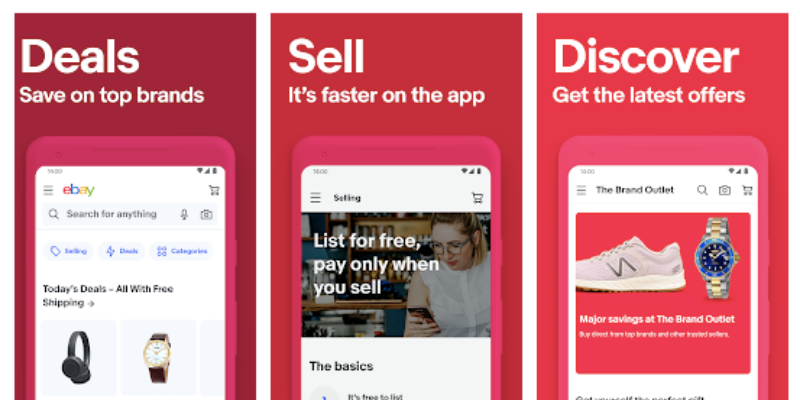
eBay offers a comprehensive range of categories to choose from. These include appliances, electronics, automobiles, home & furniture, books & magazines, pets, services, properties, and more.
TradeMade
The next application on the list is TradeMade. The platform is available as a mobile app only on both iOS and Android devices. Users can trade anything from items and services. The built-in chat feature allows you to interact with cool people and be a part of a growing, happening community.

A great thing about TradeMade is that it has carbon badges on each product, which tells you the environmental impact of all the products on the platform. This enables you to manage your carbon footprint. Also, if you use sustainable and carbon-neutral products only, you can use the carbon badges to avoid products with a negative environmental impact.
LetGo
LetGo is another customer-to-customer trading platform and OfferUp alternative that allows you to buy and sell stuff online. Whether it’s a book consuming extra space on your bookshelf or an old laptop that no one uses, you can sell it on LetGo. And similarly, if you need a couch for your movie nights or an extra phone to manage work-related calls, you can find it on LetGo.
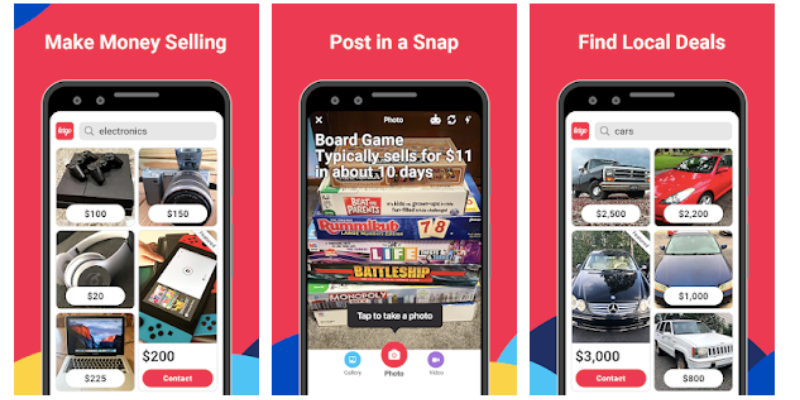
The platform has a lot of categories to choose from, such as Cars, Housing, Teck, Home, Leisure, and more. It also offers user-friendly advertising features, allowing you to run and manage ads effortlessly. LetGo is also a mobile-first platform, and it has an app for iOS and Android devices.
OLx
OLx is another classified ads platform that enables you to buy and sell products for free. You can choose from numerous categories, like Properties, Mobiles, Jobs, Bikes, Electronics & Appliances, Commercial Vehicles & Spares, and Furniture. OLx also has a subsidiary called OLx India dedicated specifically to Indian consumers. Apart from India, OLx is available in Pakistan, South Africa, and Indonesia.
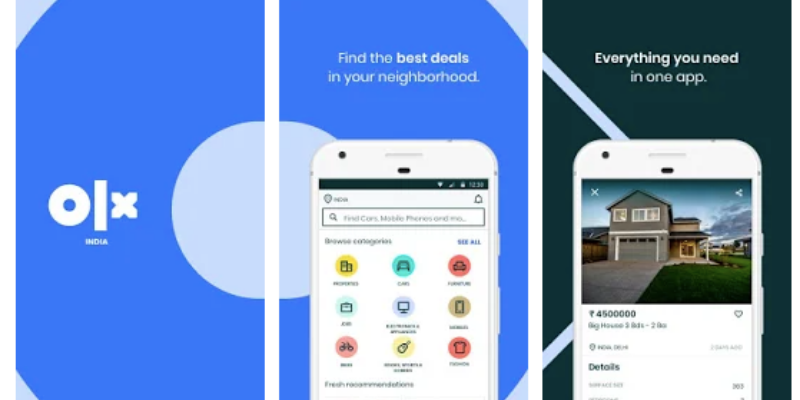
The best thing about OLx is the wide range of cities it supports. In India, for example, OLx supports not only metros and big cities but also smaller, less-known towns. This makes OLx a perfect choice for many users.
Listia
Let’s move on to the next platform — Listia. It’s a free online marketplace that enables the seamless trading of goods and services between individuals. Listia has a unique system for trading items. Users don’t need money to buy stuff. Instead, they need Listia credits, which they can earn by giving away their items or completing tasks. And the app also allows you to convert your money into Listia credits. The platform also allows you to trade items for other items.
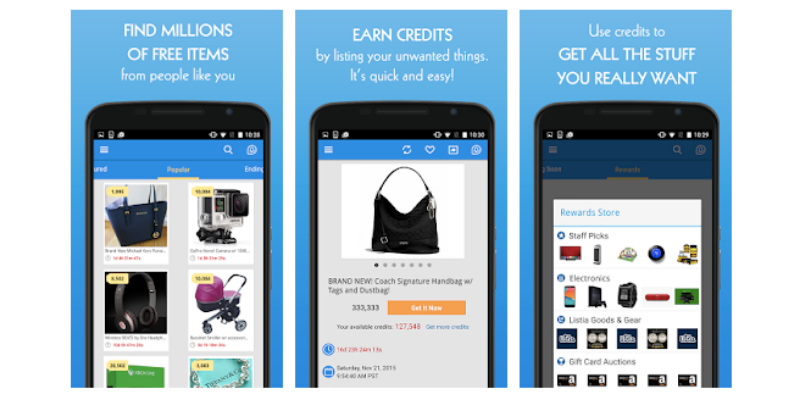
Listia doesn’t mention specific categories, but you can give and take almost anything on the app. People often sell jewelry, electronics, clothes, cosmetics, and more.
Oodle
Oodle is another popular online marketplace that has been out there since 2005. The interface looks very similar to Craigslist and other classified listing websites. You can post free listings for a wide range of products, such as home and repair, merchandise, automobiles, rentals, properties, jobs, pets, and more.
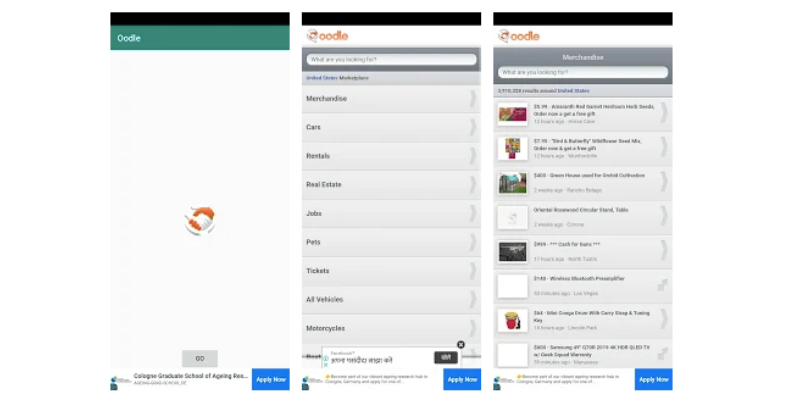
Let’s quickly talk about one good and one bad quality of Oodle. The positive thing about Oodle is its user-friendly interface. The process of posting listings and buying and selling items is super-easy. A drawback of Oodle is its outdated user interface. Compared to other websites on the list, the interface of Oodle is a bit clunky.
Close5
Let’s end this list with Close5, a mobile app that lets you buy and sell goods. The app asks you your location and displays all the products available in that area. If you want to buy a product, you can get in touch with a seller. And if you want to sell a product, you can post a free ad, and buyers will contact you.

Wrap Up: OfferUp Alternative
If you are looking for an OfferUp alternative, check out the platform discussed above and choose the one that best fits your needs. All the platforms listed in this guide work on the same customer-to-customer principle where you can trade products directly with other end-users.
So, which platform did you like the post on and why?





